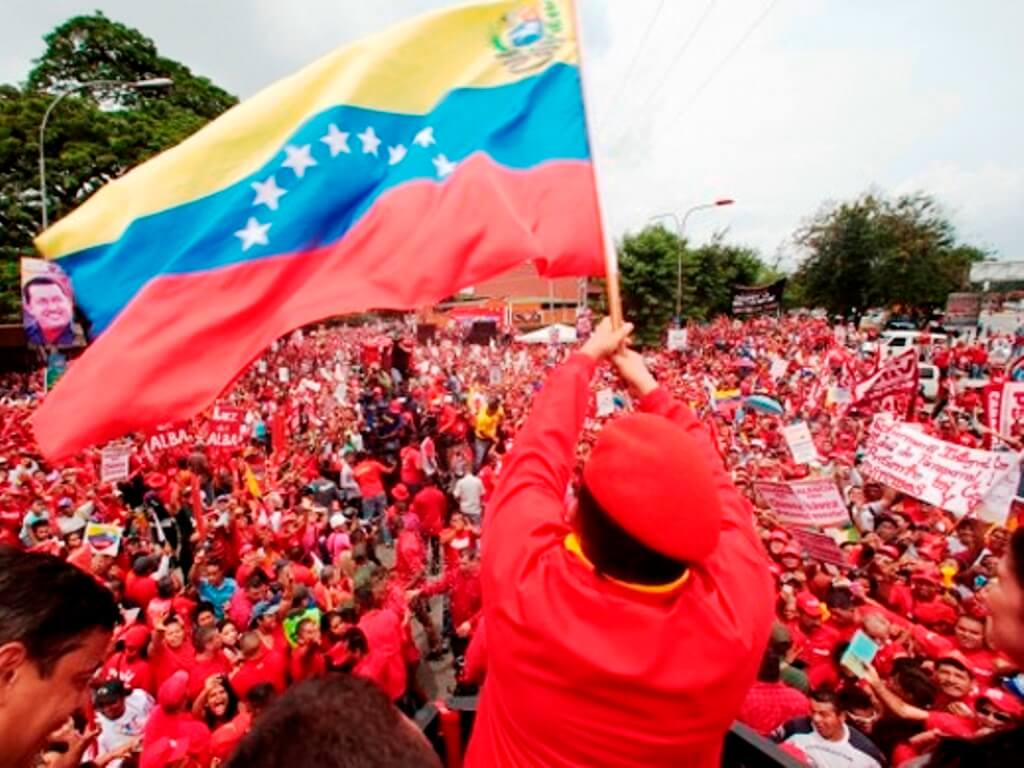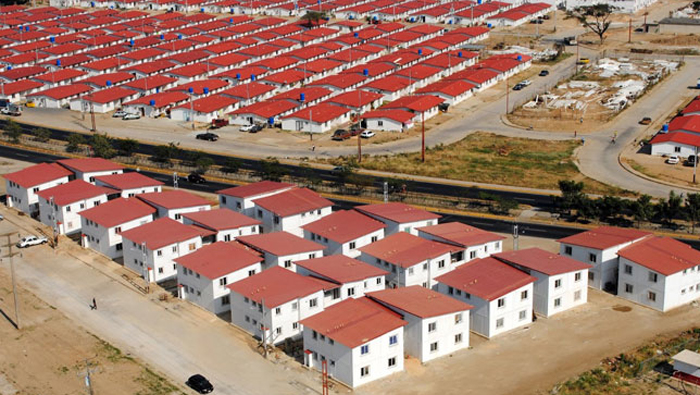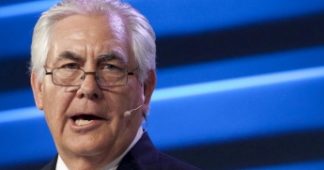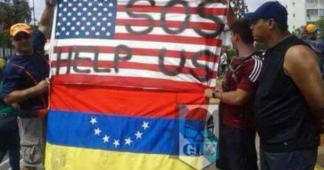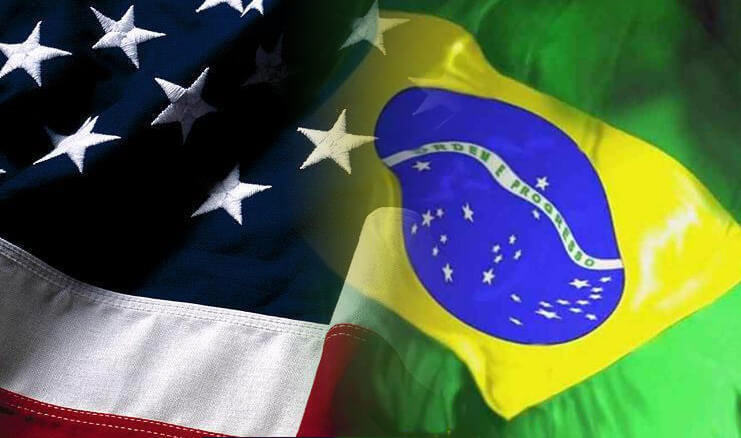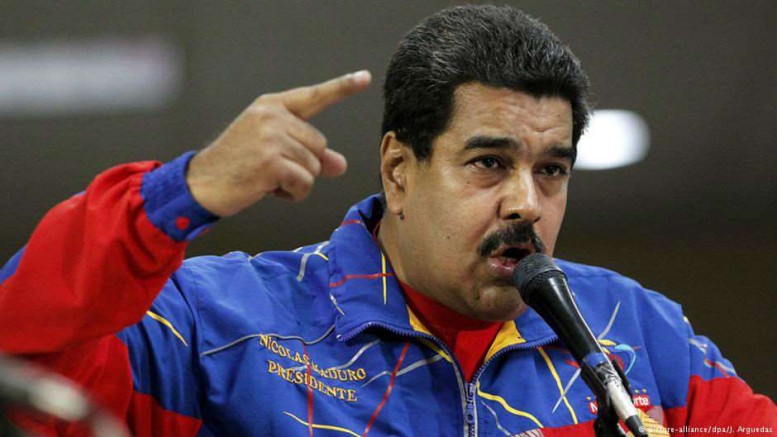By Mike Gonzalez
As Nicolás Maduro’s increasingly antidemocratic government battles violent right-wing forces, ordinary Venezuelans are watching the gains of Chavismo slip away.
The world’s media, overwhelmingly hostile to the Bolivarian process, sneer at President Nicolás Maduro’s rhetoric while presenting the right-wing parties, which certainly launched this wave of violence, as defenders of democracy. This definition of democracy apparently allows whole populations to fall into poverty and illness, with nearly one hundred people left to die in the streets.
Meanwhile, the international left has accepted the explanations government spokespersons offer, still believing that the enemy of my enemy is my friend. Thus, when a helicopter attacked government buildings on June 28, some observers simply added the event to the catalog of right-wing violence.
It is, unsurprisingly, far more complicated than that.
Oscar Pérez, a retired officer of the state security services, piloted the helicopter. Pérez has close ties to ex–Interior Minister Miguel Rodríguez Torres, whom Maduro dismissed in 2014. Torres, like the majority of the current cabinet and around half of Venezuela’s state governors, belongs to the military. He also leads one of a number of Chavista factions angling for power.
Behind a façade of governmental unity, another struggle is developing, but none of the groups are fighting to continue the revolutionary project or to reconstruct the mass movement that saved it after the attempted coup and the bosses’ strikes of 2002–3.
The opposition is also split into rival factions. Some advocate dialogue with the president, while others, especially the group that Leopoldo Lopez and his partner Liliana Tintori lead, almost certainly support the most violent street fighters. They aim not only to get rid of Maduro but also to destroy Chavismo itself.
Most Venezuelans know the major players on the Right: they belong to the wealthiest and most powerful families, who controlled the economy until Chávez arrived. Since the first street barricades went up, Maduro has tried to work with representatives of these right-wing sectors. In 2014, for example, he called in Lorenzo Mendoza, head of the Polar multinational and one of the richest Venezuelans.
Gustavo Cisneros, another member of that exclusive clan, has remained untouched in the nearly twenty years of Chavismo. He recently claimed that Venezuela needs a Macri, referring to the militantly neoliberal Argentine president, who is currently working to dismantle that country’s public sector. Cisneros likely speaks from knowledge of the Right’s strategic thinking.
As the economic and political crisis deepens, it’s become obvious that neither the government nor the opposition will offer any real solutions. While Maduro betrays the revolution by courting the bourgeoisie and sliding backwards into neoliberalism, right-wing forces have brought in violent mercenaries to try and disrupt the country even further. As these two groups struggle for power, ordinary Venezuelans are watching the gains of Chavismo slip away.
The Crisis
The depth of Venezuela’s economic crisis cannot be overstated. Poverty levels, which were still falling just three years ago, now threaten to return to pre-2012 levels.
Inflation has already pushed above 700 percent, and the real value of wages continues to fall. At the end of last year, the teachers’ union estimated that it took seventeen minimum-wage jobs to pay for the basket of basic goods and services. The shortage of even the most basic medication, let alone resources for the health-care system, brings that figure even higher in real terms. The daily appeals on radio and television for medicine say it all.
Those who are bearing the brunt of the crisis are also those who most passionately supported Chávez’s Bolivarian project and its promise that the nation’s oil wealth would go to social programs in health, education, and housing. Chávez promised to invest the surplus for the future, diversifying the economy and escaping from the trap of oil dependency.
This project has failed. Today, 95 percent of Venezuela’s external income comes from oil, as opposed to 67 percent twenty years ago. Meanwhile, GDP has fallen by 18 percent as industrial and agricultural production has collapsed in many sectors. State reserves have fallen to 40 percent of their 2012 levels. Almost 90 percent of the population cannot buy enough food, which explains the average weight loss of eight kilos. Milk consumption has dropped by half. No data is yet available on the impact of the medicine shortages.
The situation was already very serious when Venezuelans went to the polls for the December 2015 National Assembly elections, in which the Right won just under a two-thirds majority.
This result did not represent a major ideological shift. Rather, two million Chavista voters abstained — a message to the leadership and a clear expression of pain and despair from those who had to wait for hours for basic goods at rocketing prices.
Although voters didn’t have access to the hard data — the National Bank does not publish current economic information — they could see that the gulf between rich and poor was once again widening. Last year, Chávez’s ex-minister of finance, Jorge Giordani, published a statement showing that $500 billion had disappeared from the state’s coffers. The news simply confirmed what most people already knew: Chavismo had provided massive opportunities for corruption and graft, as the state bureaucracy diverted state funds into private bank accounts.
The currency exchange system’s complexity allowed importers to apply for dollars at a extremely low rate — around twelve bolivars per dollar until very recently — and then sell imported goods at prices based on a market rate hundreds of times higher. Many of those goods simply passed through Venezuela on their way to Colombia, where the profit rates rose even higher. The bank bosses, state bureaucrats, the customs service, and the National Guard all took their cut. En route, fortunes were made.
It came as little surprise that the commercial bourgeoisie hoarded goods and raised prices at will or that the industrial and financial sectors sent their capital abroad to starve the national economy. But it is surprising that those who were responsible for transforming the Venezuelan state — for attacking corruption and for introducing redistribution policies — also took their share.
Just before he died in 2013, Chavez wrote a preface to the 2013–19 national plan that acknowledged that the state had not changed and called for the tiller to be pulled in a new direction. Unfortunately, those he hoped would act were already embedded in the state bureaucracy and were benefitting from the systemic corruption.
Chavismo’s defenders will argue that the fall in the price of oil caused this crisis, but that is simply not true. While oil profits have dropped, the preceding boom should have allowed the government to save enough money to deal with the present crisis and then some, as Manuel Sutherland’s careful math has demonstrated.
The government based its budget on selling oil for sixty dollars a barrel even when prices were double that. This additional income disappeared into a corrupt system that the Chavista state administers and sustains.
Of course, the bourgeoisie have fared well. They happily colluded with the new Chavista elites to embezzle public funds, speculate in the currency markets, and invest their profits abroad.
A recent issue of the Spanish magazine Tiempo ran a cover story called “The Venezuelan Invasion.” The article did not engage in the expected attack on immigrants, but rather celebrated the wealthy Venezuelan families now investing in Spain. The names are familiar — Capriles, Cohen, Otero Silva, Baute — and their fortunes came from pharmaceuticals, media, retail, restaurants, and gold trading. The magazine tells us that the Venezuelan super-rich are safely ensconced in Madrid’s wealthiest districts, well protected from their country’s social collapse.
The crisis in Venezuela represents a complete rejection of the Bolivarian revolution: the gains made by the poor and working classes have all but disappeared while the capitalist elite have maintained their wealth and power.
Rather than resisting this worsening crisis, however, the Maduro government has instead mobilized its forces to protect itself.
Revolution in Reverse
At no point during the crisis has the Maduro government offered any kind of coherent response, reacting chaotically instead. The administration has replaced ministers frequently and announced commissions that then simply faded away. Its actions seem designed to solve internal battles rather than address the growing poverty and discontent.
That said, we can pull three clear themes out of the government’s behavior: a revival of foreign investment in extractive industries, a growing militarization of the government, and the transformation of the United Socialist Party of Venezuela (PSUV) into an instrument of political control.
Maduro has suggested one solution to the massive hole in the state budget: the Arco Minero, Venezuela’s Amazon region. The area represents 12 percent of the national territory and holds a cornucopia of minerals, oil, and gas. Additionally, it is the country’s principal source of freshwater.
Chavez rejected a development proposal some years ago for environmental reasons and in recognition of indigenous communities’ human and territorial rights. But last summer, Maduro began inviting multinational corporations to bid for concessions.
He made the first offer to Barrick, the giant Canadian gold-mining concern that had been excluded from Venezuela a decade earlier. After Chávez nationalized the mines, the company demanded hundreds of millions of dollars in compensation payments. As a gesture of his good faith, Maduro has agreed to pay this debt as well as offer a ten-year tax holiday and develop the regional infrastructure at the state’s expense.
We can already see the environmental consequences of opening the region to the rapacious mining industry — populations displaced, land and rivers poisoned, fragile rain forest and mountain ecologies destroyed. In the Arco, the military began to expel the residents soon after the government’s announcement.
Indeed, the Maduro administration immediately placed the region under military control, suspending constitutional rights. A newly formed company, Camimpeg, will administer the resources. Although the ministry of defense will run this new organization, the enterprise is autonomous — that is, private — and not publicly accountable.
The military has become a uniformed sector of the ruling state bourgeoisie, with both political control and a central economic role. Even before the recent changes, over half the cabinet belonged to the military as well as half the state governors.
We should not confuse this with Chavez’s original project for a civil-military alliance in which the military would serve the interests of the majority. Rather, Maduro has turned to the military in hopes of protecting his power.
At the same time, his political party, the United Socialist Party of Venezuela (PSUV), has become an instrument of political control. When Chavez announced the PSUV’s formation in 2006, it was part of his plan for twenty-first-century socialism. The party was supposed to represent the next step forward for the popular participatory democracy enshrined in the country’s new constitution. He intended PSUV to be an open, democratic party that would hold both government and state accountable.
What emerged, however, was the very opposite: a top-down authoritarian structure that rigidly controlled dissent and debate from the outset. Indeed, the party’s architects modeled the PSUV on the Cuban Communist Party.
For example, as the crisis deepened, the government developed a program to bring food parcels to poor homes at guaranteed official prices. The PSUV took over distribution and would only deliver the food in exchange for political allegiance. (Ironically, the scheme was riddled with corruption and failed.)
Since then, a so-called patriotic card has been introduced, also obtainable from the PSUV, without which it is impossible to get access to state services, pensions, or passports. In a word, it is an instrument of political repression.
Right-Wing Fightback
Immediately after the 2015 elections, Maduro declared a state of emergency and suspended both gubernatorial and trade-union elections.
The new National Assembly, led by the right-wing Democratic Unity Roundtable (MUD), couldn’t offer any solutions to the economic crisis, the electricity and water shortages, or the rising tide of crime either. Instead, it had two obsessions — the release of Leopoldo Lopez, who had been imprisoned in 2014 on charges of incitement to violence, and the removal of Maduro. Whatever its politicians said in public, they only wanted to gain power and overthrow Chavismo — a project that Washington vigorously supports.
In 2016, the Right launched a recall referendum to bring down Maduro. Ironically, the 1999 constitution — a central aspect of the Chavista revolution — allowed them to make this move.
The constitution’s recall clause was emblematic of Chavismo’s commitment to holding public officials accountable. It allows for 20 percent of the electorate to call a referendum halfway through a politician’s term.
Chávez himself had faced such a referendum in 2004 and won decisively. After the 2015 election, however, Maduro could no longer rely on public support, so he used heavily packed public institutions — like the election commission — to block the initiative.
Of course, the Right was exploiting the situation for its own purposes, but Chávez had emphasized that the ability to recall elected officials played a key role in a participatory democracy. Further, we should remember that every level of society discussed and debated the 1999 constitution. The referendum to elect the constitutional congress and to approve the new document was based on these same principles.
Maduro was using bureaucratic maneuvers to sidestep the Chavista constitution. He claimed that an economic war was being waged against Venezuela. While external forces have clearly deepened the crisis, largely internal developments — not to mention the government’s failure to deal with the situation — produced it.
In March, when the National Assembly refused to vote for the Arco Minero project, Maduro once again tried to avoid democratic measures, by having the Supreme Court strip the body of its powers. Luisa Ortega Diaz, who has served as attorney general since 2005 and who has unquestionable loyalty to Chavismo, declared the government’s actions unconstitutional. Maduro quickly withdrew his tame court’s decision.
The Arco Minero vote clearly demonstrates the paradox of Venezuela politics. A Chavista government was negotiating its return to the global market and to the extractive industries it had fought to escape. The deal will lay waste to the country and return the majority of the population to the misery of the pre-Chavez years.
The bourgeoisie whose purpose was to hasten that process were simply concerned that they should administer the surrender and destroy even the memory of Chavismo at the same time.
Throughout all of this, the MUD has been calling for protests. The initial marches, led by dramatically masked members of the upper class, also attracted many middle-class Venezuelans. Other protesters, however, didn’t belong to any right-wing party: frustrated, angry, and desperate, many who would describe themselves as Chavistas marched behind the nation’s elite.
In some key Chavista areas, like Caracas’s La Vega and El Valle, where the local population drove out government ministers, have seen marches and looting, which have multiplied in recent months. How else should we expect people to react, when the National Guard, the police, the military, and the PSUV all try to prevent the constitutionally protected right to protest?
Now Maduro has called for a new Constituent Assembly to convene at the end of July. This will barely resemble the 1999 meeting. Then, discussion was open and public, and people engaged with the process optimistically. This time, the Maduro administration will carefully orchestrate the event, making sure whatever changes the government chooses to introduce will be approved. There will be no debate, no transparency.
What Maduro intends remains unclear, but it will certainly involve pushing through the Arco Minero plans and privatizing parts or perhaps all of PDVSA, the state oil corporation. It may also legitimize the increasing concentration of power in fewer and fewer hands, selected not by a participatory process, but by an internal war between powerful groups thirsting for control.
Other more sinister forces have been responsible for some of the more barbaric actions that have been reported. They wear balaclavas and have taken to firing ball bearings into the chests of young men, passing pedestrians, drivers.
Their actions go beyond protest; these thugs almost certainly draw a paycheck from the far right. They are likely paramilitaries who work for the drug traffickers whose influence is growing.
They do not narrowly support the right: they aim to make the country ungovernable, to deepen the despair and the fear that affects growing numbers of Venezuelans. At the same time, the state security forces, the National Guard in particular, are increasingly involved in the violence. It is hard to tell how far these networks have interpenetrated.
Meanwhile, multinational corporations are waiting to seize the country’s enormous oil, gas, and mineral wealth under the complacent eye of an openly neoliberal government. This includes not just the United States but also China, Russia, and the other giants of global capitalism.
Some on the Left have called for violence, but it is hard to imagine a more irresponsible and cynical posture. Indeed, it doesn’t amount to much more than posturing, since the mass movement that grew around Chávez and that fought to defend his vision has been disarmed and demoralized.
Faced with the systematic undermining of democracy, the demonization of dissent, the death of trade unionists and of grassroots leaders like Sabino Romero, the erosion of popular confidence in the government, and the growing violence, committed Chavistas can do very little. A call to arms simply invites the military to intervene.
Others on the Left have chosen to say nothing or ignore the complex reality. Whatever their motives, their silence amounts to complicity with a new ruling class that hides behind the language of socialism.
These elites have helped demobilize the grassroots movement that defended its revolution in 2002–3, and whose diverse forms of community organization could have grounded a successful Chavista project.
Despite this setback, the memory of those years persists wherever people operate cooperatively in their own defense and keep the traditions of solidarity alive — even if many of them have fallen momentarily silent.
The Left outside Venezuela can help rebuild the movement by participating in an honest accounting of what went wrong. As socialists, we are not required to choose the lesser evil. Rather, we should support those in struggle in rebuilding the basis for a genuinely democratic society.
* Mike Gonzalez is a former professor of Latin American Studies at the University of Glasgow. He is the recent author of Hugo Chávez: Socialist for the 21st Century, published by Pluto Press.
